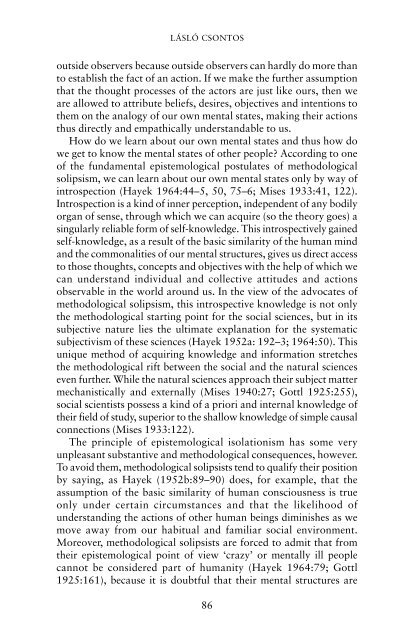Subjectivism and Economic Analysis: Essays in memory of Ludwig ...
Subjectivism and Economic Analysis: Essays in memory of Ludwig ...
Subjectivism and Economic Analysis: Essays in memory of Ludwig ...
Create successful ePaper yourself
Turn your PDF publications into a flip-book with our unique Google optimized e-Paper software.
LÁSLÓ CSONTOSoutside observers because outside observers can hardly do more thanto establish the fact <strong>of</strong> an action. If we make the further assumptionthat the thought processes <strong>of</strong> the actors are just like ours, then weare allowed to attribute beliefs, desires, objectives <strong>and</strong> <strong>in</strong>tentions tothem on the analogy <strong>of</strong> our own mental states, mak<strong>in</strong>g their actionsthus directly <strong>and</strong> empathically underst<strong>and</strong>able to us.How do we learn about our own mental states <strong>and</strong> thus how dowe get to know the mental states <strong>of</strong> other people? Accord<strong>in</strong>g to one<strong>of</strong> the fundamental epistemological postulates <strong>of</strong> methodologicalsolipsism, we can learn about our own mental states only by way <strong>of</strong><strong>in</strong>trospection (Hayek 1964:44–5, 50, 75–6; Mises 1933:41, 122).Introspection is a k<strong>in</strong>d <strong>of</strong> <strong>in</strong>ner perception, <strong>in</strong>dependent <strong>of</strong> any bodilyorgan <strong>of</strong> sense, through which we can acquire (so the theory goes) as<strong>in</strong>gularly reliable form <strong>of</strong> self-knowledge. This <strong>in</strong>trospectively ga<strong>in</strong>edself-knowledge, as a result <strong>of</strong> the basic similarity <strong>of</strong> the human m<strong>in</strong>d<strong>and</strong> the commonalities <strong>of</strong> our mental structures, gives us direct accessto those thoughts, concepts <strong>and</strong> objectives with the help <strong>of</strong> which wecan underst<strong>and</strong> <strong>in</strong>dividual <strong>and</strong> collective attitudes <strong>and</strong> actionsobservable <strong>in</strong> the world around us. In the view <strong>of</strong> the advocates <strong>of</strong>methodological solipsism, this <strong>in</strong>trospective knowledge is not onlythe methodological start<strong>in</strong>g po<strong>in</strong>t for the social sciences, but <strong>in</strong> itssubjective nature lies the ultimate explanation for the systematicsubjectivism <strong>of</strong> these sciences (Hayek 1952a: 192–3; 1964:50). Thisunique method <strong>of</strong> acquir<strong>in</strong>g knowledge <strong>and</strong> <strong>in</strong>formation stretchesthe methodological rift between the social <strong>and</strong> the natural scienceseven further. While the natural sciences approach their subject mattermechanistically <strong>and</strong> externally (Mises 1940:27; Gottl 1925:255),social scientists possess a k<strong>in</strong>d <strong>of</strong> a priori <strong>and</strong> <strong>in</strong>ternal knowledge <strong>of</strong>their field <strong>of</strong> study, superior to the shallow knowledge <strong>of</strong> simple causalconnections (Mises 1933:122).The pr<strong>in</strong>ciple <strong>of</strong> epistemological isolationism has some veryunpleasant substantive <strong>and</strong> methodological consequences, however.To avoid them, methodological solipsists tend to qualify their positionby say<strong>in</strong>g, as Hayek (1952b:89–90) does, for example, that theassumption <strong>of</strong> the basic similarity <strong>of</strong> human consciousness is trueonly under certa<strong>in</strong> circumstances <strong>and</strong> that the likelihood <strong>of</strong>underst<strong>and</strong><strong>in</strong>g the actions <strong>of</strong> other human be<strong>in</strong>gs dim<strong>in</strong>ishes as wemove away from our habitual <strong>and</strong> familiar social environment.Moreover, methodological solipsists are forced to admit that fromtheir epistemological po<strong>in</strong>t <strong>of</strong> view ‘crazy’ or mentally ill peoplecannot be considered part <strong>of</strong> humanity (Hayek 1964:79; Gottl1925:161), because it is doubtful that their mental structures are86

















